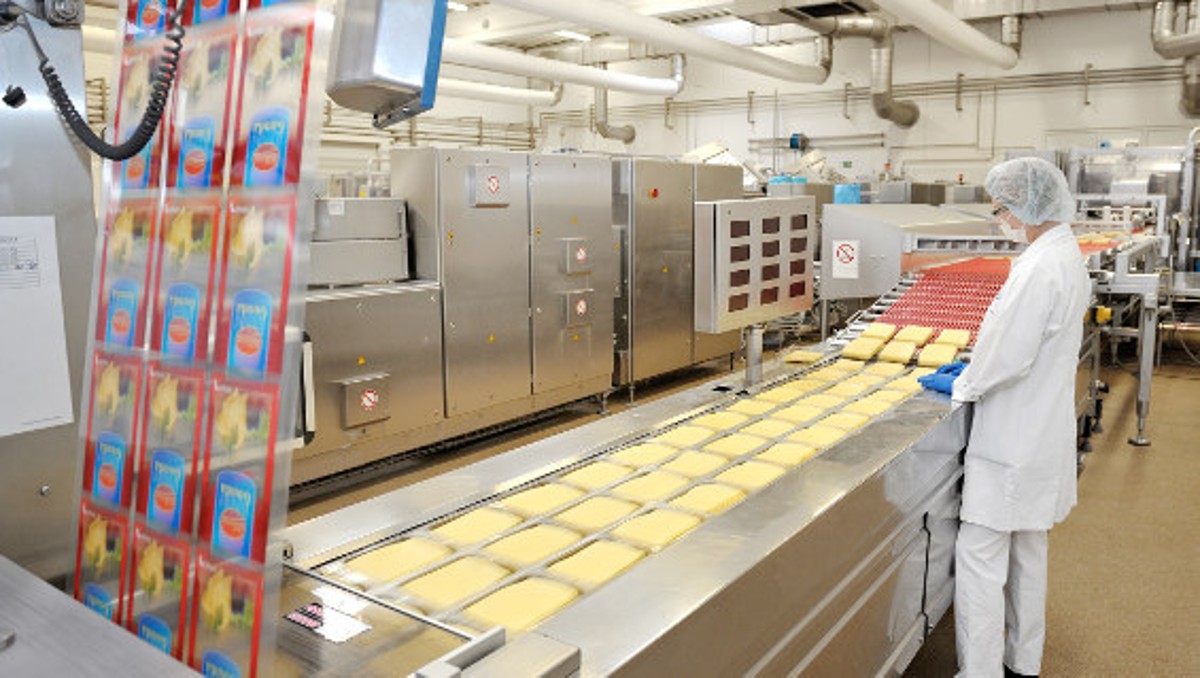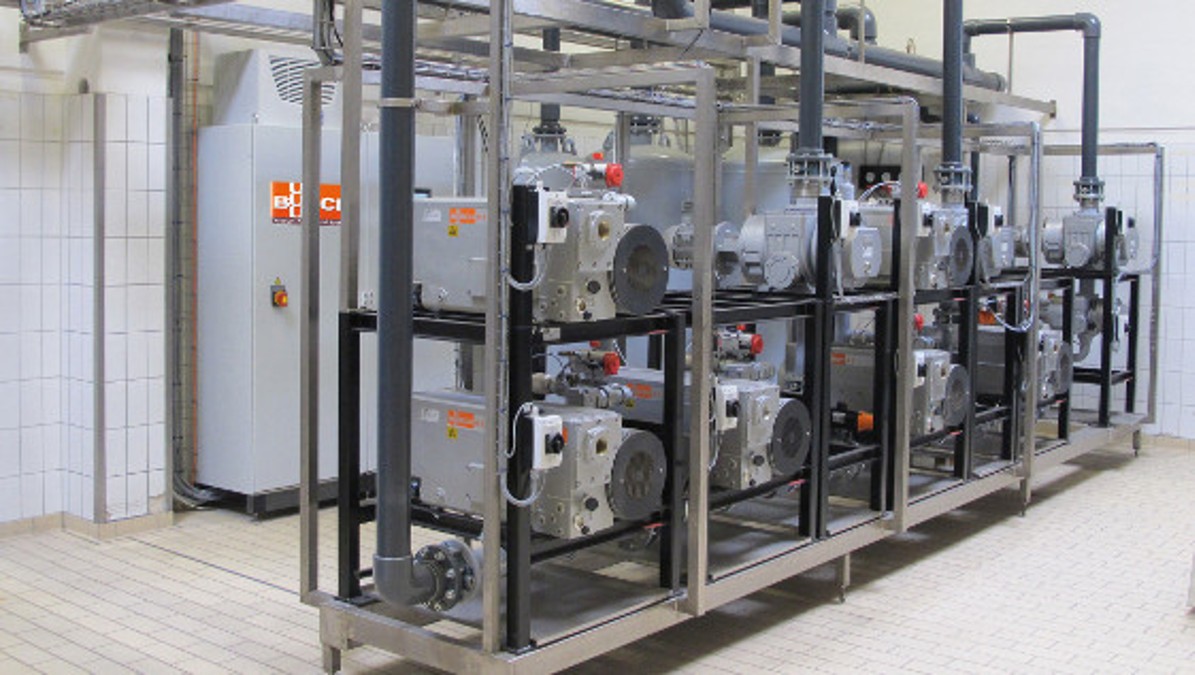Busch News & Media
Energy Savings in Dairy Food Packaging with Central Vacuum Supply from Busch
Energy Savings in Dairy Food Packaging with Central Vacuum Supply from Busch
DMK Deutsches Milchkontor GmbH
Maulburg, Germany
|
April 12, 2016
|
5 min
DMK Deutsches Milchkontor GmbH produces cheese products at its production facility in Georgsmarienhütte, Germany. The cheeses are vacuum packed after processing in several packaging lines.
The vacuum supply for the packaging machines is provided by a
Busch centralized vacuum system, which supplies both the packaging lines and the thermoforming machines. After a year of operation (October 2015) the centralization of the vacuum system
saved about 100,000 kW/h, reducing DMK’s energy costs by approximately € 15,000.
DMK
The production facility in Georgsmarienhütte manufactures mainly sliced cheese and Mozzarella in packaged portions. These products are distributed throughout Germany, and are also exported to other European countries. Other products include milk and whey concentrates, which are mostly used in-house for further processing. The site normally operates a three-shift system five days a week, and employs a total of 350 staff.
Various types of sliced cheese for end consumers are packaged in three packaging lines by thermoforming machines, with products packed as both DMK and external brands. Two additional thermoforming machines package Mozzarella in 2.5 kg and 10 kg blocks for further processing by customers.
Vacuum system at DMK
DMK conducts its energy management according to ISO 50001 standards, leading the company to seek a solution to
reduce vacuum system energy consumption. All five thermoforming machines originally had two vacuum pumps each:
- one to form the foil into the mould
- and one to extract air from the packaging chamber
The DMK energy manager, Yvonne Gödeker, wished to
reduce the number of vacuum pumps, and relocate them
away from the production area. The production area is air-conditioned, so heat emitted by vacuum pumps was causing increased energy costs.
She found competent partners at Busch, who recommended the installation of a centralized vacuum system. Busch was subsequently awarded the contract to design, build, install and commission this centralized vacuum system. System commissioning was completed in late 2014.
After a year of operation (October 2015) the centralisation of the vacuum system had saved about 100,000 kW/h, reducing DMK's energy costs by approximately 15,000 Euros.
This saving was achieved by a combination of factors, but mainly by the vacuum control system:
only the vacuum pumps needed to meet current demand are in operation. Vacuum is supplied by a pipework system with three vacuum circuits:
1.
Rough VacuumSeveral vacuum pumps maintain a
permanent rough vacuum of between 30 and 40 mbar in the vacuum reservoirs and pipework system. This vacuum is available directly at the packaging point to evacuate the packaging to rough vacuum level. The medium vacuum circuit is then activated.
2.
Medium VacuumThe medium vacuum modules
evacuate the packaging chamber and the packaging from rough vacuum level to the final package pressure of less than five mbar. This two-stage evacuation has the advantage of
speed. The final pressure is achieved rapidly, allowing
short cycle times. The two-stage process is also the most
energy-efficient method of achieving a vacuum of less than 5 mbar. Panda vacuum pumps in a medium vacuum unit are used as vacuum boosters.
3.
Forming VacuumThis vacuum circuit is used to form the plastic foil into trays. The vacuum level required is between 100 and 200 mbar.
A controller maintains the required vacuum level in all three vacuum circuits, matching the demand created by the individual packaging lines. Vacuum pumps are switched on or off as required, maintaining the desired pressure in the vacuum reservoirs.
The three packaging lines rarely require maximum pumping speed simultaneously, so in general only some of the vacuum pumps are in operation.
In the original decentralized vacuum system, both vacuum pumps were started with the packaging machine and ran continuously at full speed. This maximum output was dimensioned to meet the demand created by the shortest cycle time and largest packaging volume of the machine.
The new centralized vacuum system has drastically reduced the running time of individual vacuum pumps, which in conjunction with the two-stage package evacuation has resulted in massive energy savings.
The centralized vacuum system is located in an intermediate floor above the production and packaging areas. The relocation of vacuum pumps installed directly to the packaging machines prevents emitted heat from reaching the packaging machines and production area. In addition, no warm air from vacuum pump exhausts is given off to air-conditioned rooms. This has reduced the cooling required by the packaging machine tools, and air-conditioning costs are also lower.
As the centralized vacuum system is now located externally, it is no longer necessary for service personnel to enter the production area.
Service technicians can carry out maintenance without interrupting production, as the system has a reserve vacuum unit.
Starting this reserve unit allows the first unit to be disconnected from the network and maintenance tasks to be carried out. This has
reduced expenditure, as no production time is lost and maintenance is no longer required at weekends when costs are higher.
DMK has signed an
all-inclusive service agreement with Busch. This means Busch will provide a five-year warranty for the system, carry out all maintenance tasks, and take immediate remedial action if a fault should arise.
The DMK energy manager Yvonne Gödeker is completely satisfied with the choice of Busch as partner for the vacuum supply energy reduction project. Not only have the projected energy savings been achieved and exceeded, the entire project was carried out without technical difficulties from design, construction and installation to everyday operation.
About DMK Deutsches Milchkontor GmbH
DMK Deutsches Milchkontor GmbH is one of the largest dairy companies in Germany, employing more than 7,000 staff at 28 sites in ten federal states. The company was formed by the merger of Humana and Nordmilch, and processes milk from about 9,400 producers to manufacture 6.7 million tons of high-quality cheese products per year. DMK customers include national and international retailing companies, food manufacturers, and large volume consumers. The company has a wide product portfolio, ranging from basic milk products and cheese to milk-based food manufacturing ingredients and baby food, ice cream and health food.
Maulburg, Germany
|
April 12, 2016
|
5 min

